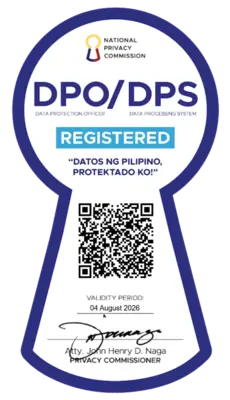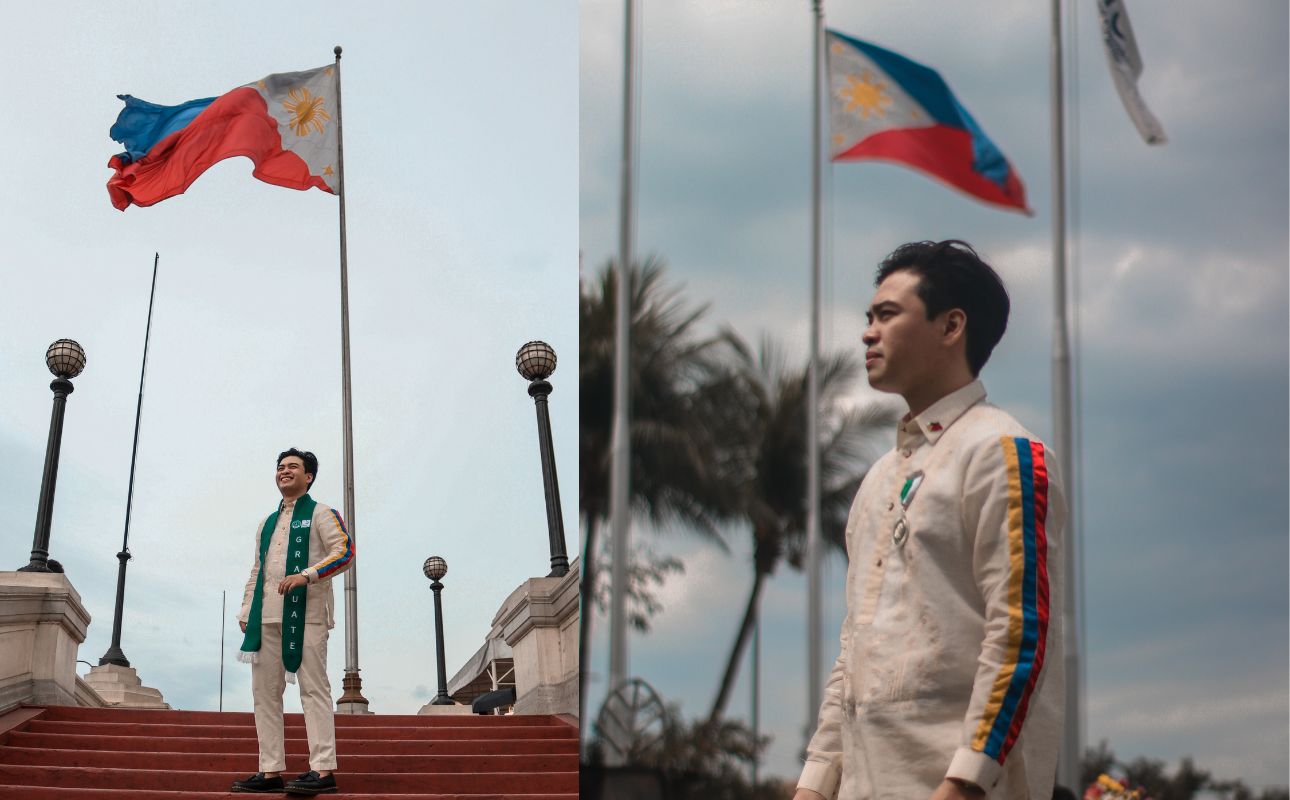If my memory serves me correctly, the idea of wearing a Barong Tagalog bearing our flag’s colors started when I finished my last academic term way back in 2022. I figured that I needed a special barong to mark the significant occasion of graduating from college – something that would embody my lifelong commitment to serving the Filipino people.
ON THE SIGNIFICANCE OF THE PHILIPPINE FLAG
National symbols are important tools in unifying a country. These symbols, whether abstract or concrete, are necessary for the establishment of social cohesion as they create a national identity and a collective national consciousness. Given our cultural and linguistic diversity, colonial history, and political development, the Philippines’ own national symbols have important roles in nation-building.
We have seen our own national symbols such as the national flag, anthem, and coat of arms among others, displayed in our schools and government offices, and we often think of them as just passive fixtures. But the truth is, they’re not.
When I look at our flag and all its glory, I see a culturally diverse, maritime, and archipelagic country, unified and bound together by the collective aspirations of our people. It is a poignant symbol of our sovereignty, a physical manifestation of the country’s peace-loving character and the Filipino people’s resolute spirit in its quest for democracy and independence. Its fabric, woven together by threads depicting every Filipino life, is a visual summation of our nation’s history. It is our shared defeats and victories, a solemn reminder of the sacrifice, bravery, and heroism our forefathers have shown in defense of our freedom. Above all, it is a reminder that I am part of a collective, that I serve something far greater than myself - that we serve a purpose far greater than our own self-interests.
Simply put, I see the flag as an extension of ourselves. When we go to other countries and we see our flag, I immediately pull out my phone and take a photograph internally saying, “Uy, bansa ko ‘yan!” It’s quite similar to when we’re abroad and we hear Filipinos speaking their respective mother tongues. You’d probably be confident enough to walk up to them and say “Uy, Pilipino ka pala!” or “Kababayan!”
That’s how national symbols work. They evoke a sense of belongingness, a sense of identity, and even a sense of warmth. In the case of the Philippine flag, it is the Filipino people embroidered in blue, red, white, and yellow.
I was given a prompt for this article, asking what the Philippine flag would say to the Filipino youth if it could speak. I think this national emblem would tell young Filipinos to remain vigilant of the political climate of the country and monitor the fast-paced developments around the globe, especially those from maligned actors.
Echoing our respected academics, Philippine democracy is historically proven to be fragile. I believe that the Philippine flag will want to see the youth protecting the integrity of our democratic institutions and the democratic values which are of vital importance. It is paramount for the Filipino youth to actively participate in nation-building, on top of them practicing their right to suffrage.
At the end of the day, democracy is so much more than just voting! I say go out there and fight for your advocacies, cultivate and bring them to life. Engage in meaningful conversations with those around you. Discuss your local community’s issues (No, not the chismis kind!), and create a small project addressing them. Perhaps strike a conversation among classmates on regional and global issues. It matters that our youth engage their local communities at the grassroots level to understand the different realities on the ground. These small efforts slowly build up and positively contribute to the development of a healthy, participatory, and deliberative democracy.
ON PATRIOTISM
Situated on my study table are books, never ending piles of printed research papers, pens, and highlighters. Beside it is a Philippine map, a goals and dreams board, and a small bust of Dr. Jose Rizal. The bust is a souvenir I bought from a trip to Rizal’s home in Calamba, Laguna many years ago when I was in grade school. Rizal, much like other Filipinos, was my first definitive introduction to patriotism.
My sense of patriotism was lovingly cultivated when I was growing up. My mother, Juliet, made sure of that. This patriotism is her most valuable gift to her young son.
She immersed my sister and I in Philippine history, mostly through documentaries, books, and stories. As a child, I vividly remember learning about Dr. Jose Rizal through my mother’s simplified narration of his writings before bed time. More so, my choice to study at De La Salle University-Manila (DLSU) was partially influenced by my mother, who often watched DLSU political science faculty members analyze Philippine politics, especially during election season.
As a self-professed political junkie, political systems and political history had me held in a choke hold. The more I read about it, the more I loved it. When I became a student at DLSU, I yearned to learn from the country’s top experts in the hopes of contributing to the ever-evolving literature in an effort to generate knowledge that could positively impact society, specifically to strengthen and protect democratic institutions and its concurrent values.
The classrooms and the library were my second homes. Those Lasallian walls heard the passionate lectures and conversations of my professors and college friends, discussing the different remedies to Philippine problems, may they be political, economic, or social.
Through these colorful debates and conversations, it became apparent to me that understanding the Philippines’ political history enables us to discern the development and interconnectedness of the country’s perennial problems. After all, without precisely articulating a research question, no accurate answer can be generated. More so, without reviewing the literature, one cannot identify gaps, nor can we identify the root cause of a problem or explain a phenomenon. Simply said, we must look back to see where we are now, and how we got here in order to identify actionable steps forward. From then on, my friends and I envisioned the prospects of enhancing the well-being of our countrymen.
The aspiration that these socio-political and economic issues could eventually be addressed with the right amount of will – that Filipinos could live a far better life than what we have right now – serves as our enduring motivation to fight for a better Philippines.
I continue to read and learn about our country’s history, along with the viable solutions advocated by our respected academics. While the journey can be frustrating, our commitment to serving the Filipino people remains unwavering.
After all, the responsibility and duty to fight for our country falls upon us alone.
ON SERVING MY COUNTRYMEN
I love the Filipino people and I love serving this country. In fact, the word “love” is an understatement.
This dedication to be able to serve the Filipino people is a profound commitment I hold myself accountable to. Serving our people, wherever field that may be, is my life’s passion and vocation. Waking up every day, there is a sense of purpose to serve others that awakens alongside my consciousness. There is nothing more that brings me utmost joy than to faithfully serve my country.
On service, the most important lessons I continue to live by to this day are simple but are oftentimes tremendously challenging to accomplish:
Foremost, service involves listening and comprehending. We should continue to genuinely reach out and listen to our people, especially the marginalized. Inclusive discussion and continued discourse on key issues are integral to promoting national development, whether these discussions are small or held through broader advocacy platforms.
Equally important is the need to champion our beliefs and principles while being receptive to differing perspectives. I always like to think that nobody has a monopoly on good ideas, provided that the ideas are founded on sound evidence, facts, and reliable scientific data. After all, what is democracy without deliberation and differing perspectives?
At the end of the day, my goal is to use what I have learned to conduct research and generate more knowledge in service and for the benefit of the Filipino people. All knowledge, regardless of what field it belongs to, must be for the benefit, advantage, and interest of the common good. Otherwise, what useful purpose does it serve?
Donning the Philippine flag-inspired Barong Tagalog to my college graduation was more than just wearing something special to commemorate the occasion. It was a renewal of my personal commitment and conviction to serving the Filipino people. For many people, a flag is just a flag. But to me, the flag and what it represents, is my entire being. Wherever life takes me, I carry the national colors, with the aspiration to serve the country to the best of my capabilities.
Isang karangalan ang makapaglingkod sa ating bayan. Let me end with a quote from a message I posted on graduation day, in the hopes of inspiring our readers:
“To our beloved country and people who have inspired my work, I commit to restlessly serving you with all the heart, strength, and care I can fathom.”
About the author:
Josemari Janathiel "Nathan" P. Borla, 24, is a researcher and analyst. A civil servant, his research focus includes international trade, blue economy, maritime governance, and political disinformation.
The Paranaque-born Kapampangan graduated Magna Cum Laude with a degree in Political Science, minor in Economic Studies from De La Salle University-Manila in February 2023.
A staunch good governance advocate, Mr. Borla has spoken in various youth-led organizations, events, and forums to bring about awareness in strengthening democratic institutions. Beyond professional work, Nathan is a musician and fitness enthusiast.
The views and positions expressed by Mr. Borla does not represent the organizations and entities he is affiliated with.




